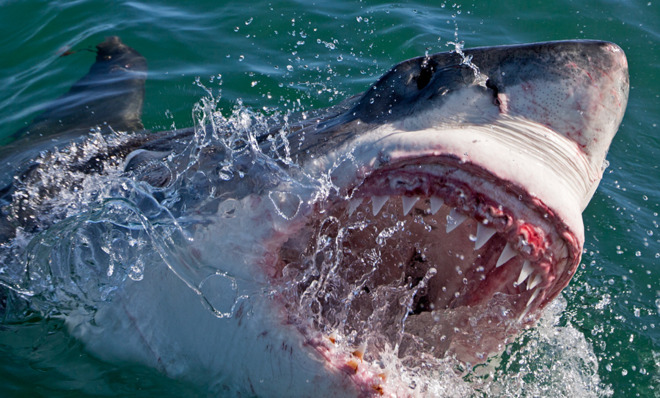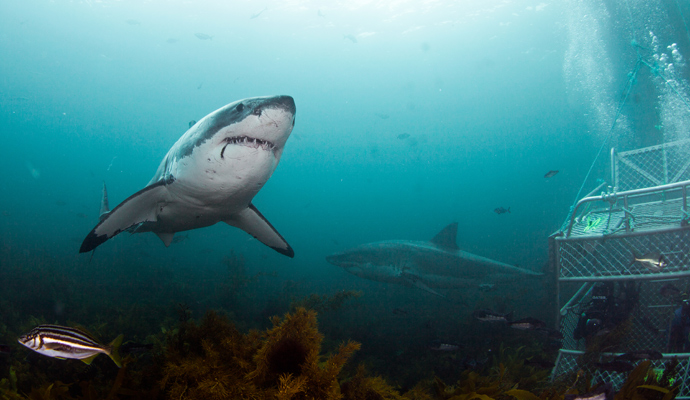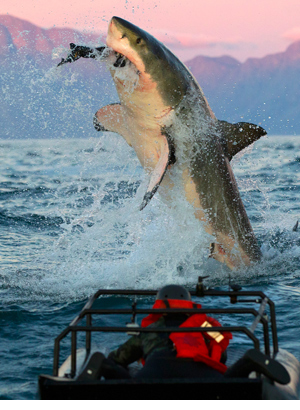The history of Shark Week: How the Discovery Channel both elevated and degraded sharks
For the past 27 years, Discovery has scored massive ratings and enormous goodwill with Shark Week. But a recent detour into fiction has enraged some scientists.

A free daily email with the biggest news stories of the day – and the best features from TheWeek.com
You are now subscribed
Your newsletter sign-up was successful
At 27 years old, Discovery Channel's Shark Week has become an unlikely staple of the American summer. It's the longest-running cable TV programming event ever, and it continues to pick up speed every year. Last year's Shark Week was the network's highest-rated ever, garnering 53.17 million total viewers. 30 Rock's Tracy Jordan famously proclaimed that everyone should "live every week like it's Shark Week," and Stephen Colbert declared it "one of the two holiest holidays" alongside Christmas.
So where did Shark Week come from? Executive producer Brooke Runnette told The Atlantic that it all started when a group of Discovery executives were at a bar with some colleagues when "one of them said something like, 'You know what would be awesome? Shark Week!' And somebody in that nexus scribbled it down on a napkin.'"
But according to Eileen O'Neill, Discovery Channel's group president, the story is much less exciting than that. "It started with a scheduler and the founder of the company, John Hendricks, brainstorming," she told The Week. "They started with the premise that sharks are such predatory beasts, and rated well, and thought, 'What if [we] took advantage of the August beach time?'"
The Week
Escape your echo chamber. Get the facts behind the news, plus analysis from multiple perspectives.

Sign up for The Week's Free Newsletters
From our morning news briefing to a weekly Good News Newsletter, get the best of The Week delivered directly to your inbox.
From our morning news briefing to a weekly Good News Newsletter, get the best of The Week delivered directly to your inbox.
With that, the first-ever Shark Week debuted in the summer of 1988 with the show Caged in Fear, which explored the science of creating and testing motorized shark cages. With just 10 programs in the lineup, primetime ratings nearly doubled from Discovery's normal average.

(Chris Fallows/Discovery Channel)
Shark Week benefited immensely from its implicit association with Steven Spielberg's mega-blockbuster Jaws, which came out in 1975. Shark Week's third and fourth years, which aired in 1990 and 1991, were billed as Shark Week: The Revenge and Shark Week: They're Back — a kind of winking tribute to Jaws' (much sillier) sequels.
But despite the cheeky labels, the content was heavily devoted to conservation efforts and correcting the kinds of misconceptions about sharks that Jaws helped to spread. Programs like African Shark Safari, Sharks on the Brink of Extinction, The Man Who Loves Sharks, Sharks: Hunters of the Ocean, The World of Sharks and Barracuda, and Sharks of Polynesia were designed to defuse the cultural stigma around sharks.
A free daily email with the biggest news stories of the day – and the best features from TheWeek.com
In the 1990s, Discovery Channel actively invested in Shark Week, sending its top documentarians, photographers, and videographers out on assignment to feed the audience's seemingly insatiable appetite. In 1999, Shark Week aired its first-ever live program, Live From a Shark Cage, which offered exactly what it promised. In 2001, Discovery aired never-before-seen footage of great white sharks breaching the surface with the program Air Jaws. Thanks in part to the Phantom camera — a high-speed camera that captured footage at 1,000 frames per second — Shark Week's programming in the past decade has featured some of the best footage of sharks in their natural habitat ever caught on video, offering breathtakingly detailed looks at how sharks feed, swim, and act.
But while cultural adoration for Shark Week hasn't waned in the slightest, the scientific community has taken an increasingly critical stance against it. Last year, Wired's David Shiffman argued, "At its best, Shark Week educates people about the most misunderstood animals on our planet while inspiring them to protect the ocean. At its worst, it perpetuates fear and misunderstanding."

This year, Discovery Channel was criticized for an ill-advised attempt at viral marketing. In June, a YouTube user posted camera phone footage of a shark in Lake Ontario, which quickly went viral. Only after fear began to spread among the seaside community of Kingston did Discovery fess up and admit the hoax. "Discovery wants to quell the concerns of Canadians everywhere and reveal that the widely-circulated video of a shark swimming in Lake Ontario is, in fact, not a real shark," admitted the network. "The video of the incredibly life-like prosthetic model shark is the first stage of a multi-level marketing campaign tied to the channel's iconic summer event, Shark Week."
It's the latest example of Shark Week eschewing its former focus on science in favor of fear-mongering and sensationalism. Last year's Megalodon: The Monster Shark Lives was the most-watched program in Shark Week, but it misled audiences into believing that the long-extinct, 50-foot shark still exists. The only concession to the truth? A blink-and-you'll-miss-it disclaimer that flashed before the two-hour special aired.
And a look at this year's lineup shows that Discovery has doubled down on its faux-documentary programming with programs like Lair of the Mega Shark, Megalodon: New Evidence, Zombie Sharks, Alien Sharks: Return to the Abyss, and Shark of Darkness: Wrath of Submarine.
O'Neill defended Shark Week's more sensationalized programming, saying that "the culture right now...has certainly evolved to kind of appreciate the fear factor of sharks." This year's programming, she said, reflects "Americans' appetite to be absolutely be challenged on fear levels and fantasy levels and mystery levels, which I think you see throughout the television universe right now."
Given Megalodon's record-setting ratings last year, it's a sound business strategy — but many shark scientists are furious, with some even claiming that they were deceived into appearing on camera.
Numerous scientists have expressed concern that Shark Week is actually becoming detrimental to the field of shark science. Speaking with Discover Magazine, David Kerstetter, an assistant professor at Nova Southeastern University's Oceanographic Center, complained that "rather than having Shark Week engage the audience with stories of the very real (and quite enthralling) research going on with elasmobranchs, those of us in the field now spend our public outreach efforts debunking silly things like 'mermaids' and the continuing existence of Megalodon."
However, there are hopeful signs that Discovery Channel's commitment to legitimate science is still a priority. One of the least-discussed aspects of Shark Week is its promotion of conservation efforts. According to Discovery, more than 70 million sharks are killed annually, "either for sport, caught as by-catch, or hunted for their fins." Since 2010, Discovery has enlisted non-profit Oceana to promote conservation efforts, which include, among other things, airing anti-finning PSAs during Shark Week.
It might sound like a cynical attempt to grab a little positive publicity, but the PSAs attached to Shark Week's programs actually have made an impact. Inspired by a Shark Week special he saw on declining shark populations, 9-year-old Massachusetts resident Sean Lesniak wrote a letter to his local representative, state Rep. David Nangle, urging him to do something about the shark-finning problem. That resulted in a bill that was signed into law by Gov. Deval Patrick, making the possession and sale of shark fins illegal.
"We love the fact that Shark Week does inspire conservation," O'Neill said. "It's a bit of a celebration of sharks, but in a healthy way. We don't want to glorify them in any end of the spectrum — they're not home pets and they are fierce predators — but the vast majority of the breeds of sharks want to be left alone by humans."
And as for the scientists, well, it's not too late for Discovery to win them back over — if the channel renews its commitment to the science. Mike Lowe, a post-doc at Wood's Hole Oceanographic Institution, told Discover Magazine that appearing as an expert in future Shark Week programs isn't out of the question for him. "It's tempting to say no on the basis of their recent and future programming," he says. "But given the right opportunity and some serious soul searching, I would have to consider it."
**Embedded vertical photo: Chris Fallows/Discovery Channel**
Matt is an arts journalist and freelance writer based in Washington, D.C. He has written about film, music, and pop culture for publications including Washington City Paper, The American Interest, Slant Magazine, DCist, and others. He is a member of the Washington D.C. Film Critics Association.
-
 The best music tours to book in 2026
The best music tours to book in 2026The Week Recommends Must-see live shows to catch this year from Lily Allen to Florence + The Machine
-
 Gisèle Pelicot’s ‘extraordinarily courageous’ memoir is a ‘compelling’ read
Gisèle Pelicot’s ‘extraordinarily courageous’ memoir is a ‘compelling’ readIn the Spotlight A Hymn to Life is a ‘riveting’ account of Pelicot’s ordeal and a ‘rousing feminist manifesto’
-
 The EU’s war on fast fashion
The EU’s war on fast fashionIn the Spotlight Bloc launches investigation into Shein over sale of weapons and ‘childlike’ sex dolls, alongside efforts to tax e-commerce giants and combat textile waste